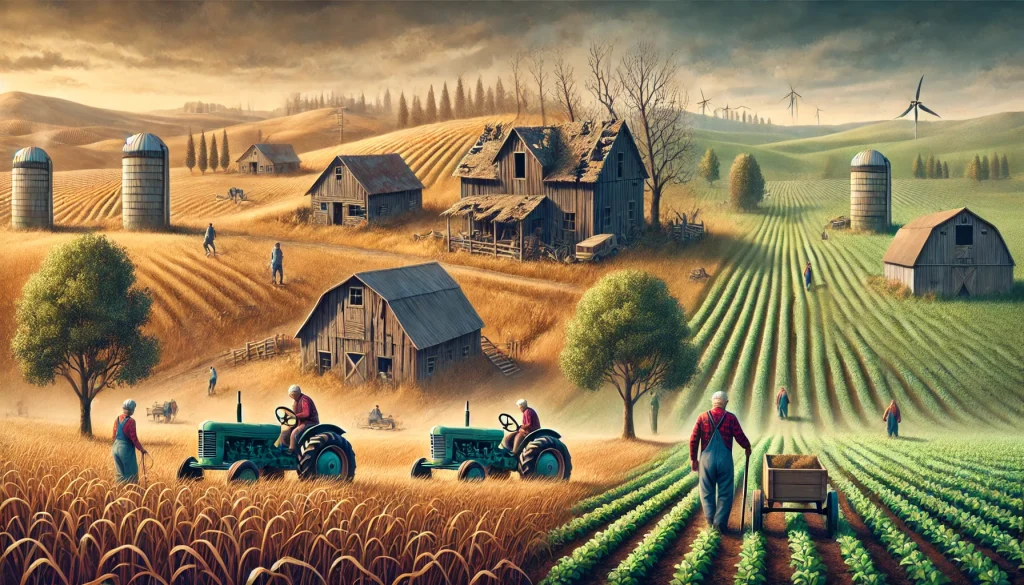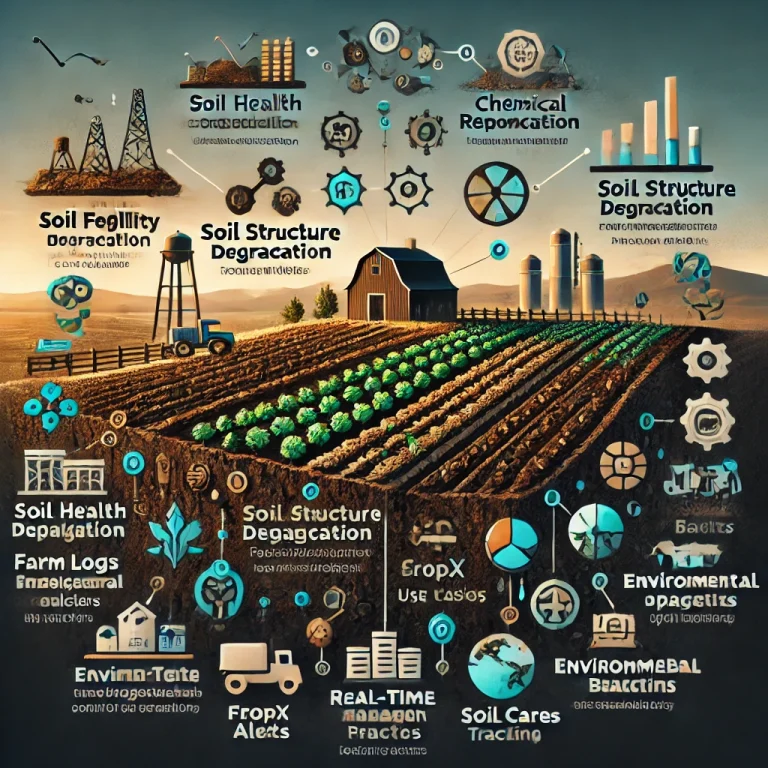Problem Statement:
The farming industry is facing a significant demographic crisis, particularly in developed countries where the average age of farmers continues to rise. With many farmers now in their 50s, 60s, or older, the industry is grappling with a growing challenge: the lack of younger generations willing to take over the family farm or enter the agricultural sector. This trend is exacerbated by several factors, including the perception of farming as a less attractive or viable career, the high costs of entry, and the difficulties associated with acquiring land and financing. The result is a shrinking workforce, leading to concerns about the long-term viability of the farming industry, food security, and the sustainability of rural communities. Without a clear succession plan or the infusion of new talent, the future of farming is at risk. As older farmers retire without successors, farms may be sold, consolidated, or left fallow, further contributing to the decline of rural economies and the loss of agricultural knowledge and skills. Addressing this issue requires innovative solutions that not only make farming more appealing to younger generations but also provide the necessary support, resources, and opportunities for them to succeed. The challenge lies in bridging the generational gap, ensuring that farming remains a sustainable and attractive career option, and preserving the agricultural heritage that is vital to global food security.
Pain Points:
- Aging Farmer Population: The average age of farmers is increasing, with many nearing retirement age.
- Lack of Succession Planning: Few farmers have clear plans for passing on their farms, leading to uncertainty about the future.
- High Barriers to Entry: Young people face significant challenges in entering the farming industry due to high costs and limited access to land and financing.
- Perception of Farming as Unattractive: Farming is often viewed as a less viable or desirable career option by younger generations.
- Decline of Rural Communities: The aging farmer population contributes to the decline of rural economies and the erosion of community life.
- Loss of Agricultural Knowledge: As older farmers retire without successors, valuable knowledge and skills may be lost.
- Food Security Concerns: The shrinking farming workforce raises concerns about the ability to maintain stable food production.
- Consolidation of Farms: Without younger successors, farms may be sold or consolidated, leading to fewer, larger farms and reduced diversity in farming practices.
- Environmental Sustainability Risks: The lack of new talent in farming threatens the adoption of sustainable practices that are critical for environmental stewardship.
- Limited Support for Young Farmers: Existing support systems and resources for young and beginning farmers are often inadequate or difficult to access.

Future Vision:
The future of farming depends on revitalizing the industry by attracting and supporting a new generation of farmers. This vision includes the development of a platform that addresses the unique challenges faced by young and beginning farmers, providing them with the resources, education, and opportunities they need to succeed. The platform would serve as a comprehensive hub for succession planning, offering tools and guidance for older farmers looking to transition their farms to the next generation. It would also connect young aspiring farmers with mentors, financial institutions, and landowners, facilitating access to land, capital, and knowledge. By offering tailored educational programs, the platform would help young farmers acquire the skills needed for modern, sustainable agriculture, including digital tools, precision farming, and regenerative practices. Additionally, the platform would promote farming as a viable and rewarding career, highlighting success stories, innovative practices, and the critical role farmers play in ensuring food security and environmental sustainability. Partnerships with government agencies, agricultural organizations, and educational institutions would ensure that young farmers receive the support and recognition they need. Ultimately, this platform would help bridge the generational gap in farming, preserving rural communities, safeguarding food security, and fostering a resilient and sustainable agricultural sector for the future.
Use Cases:
- Succession Planning Tools: The platform offers resources and tools for older farmers to create succession plans and transition their farms to younger generations.
- Mentorship Programs: Young farmers connect with experienced mentors who provide guidance, support, and knowledge transfer.
- Access to Land and Financing: The platform facilitates connections between young farmers and landowners, as well as access to loans, grants, and investment opportunities.
- Educational Programs: Tailored educational content on modern farming techniques, sustainability, and business management.
- Networking Opportunities: The platform provides forums and events where young farmers can connect, share experiences, and collaborate.
- Promotion of Farming Careers: Campaigns and content that highlight the benefits and rewards of a career in farming, aimed at attracting new talent.
- Regenerative Agriculture Support: The platform offers resources for adopting sustainable and regenerative farming practices.
- Policy Advocacy: The platform advocates for policies that support young and beginning farmers, including land access, financial support, and education.
- Farm Transition Matching: A service that matches retiring farmers with young aspiring farmers, facilitating smooth transitions.
- Community Building: The platform fosters a sense of community among young farmers, encouraging collaboration and mutual support.
Target Users and Stakeholders:
Target Users:
- Older farmers looking to transition their farms to the next generation.
- Young aspiring farmers seeking to enter the agricultural industry.
- Agricultural cooperatives and organizations supporting young and beginning farmers.
Stakeholders:
- Government agencies focused on agriculture, rural development, and food security.
- Financial institutions offering loans, grants, and investment opportunities for young farmers.
- Educational institutions and extension services providing agricultural education and training.
- NGOs working on sustainable agriculture, rural development, and food security.
- Technology companies developing tools and platforms for modern and sustainable farming practices.
Key Competition:
- Farmers Business Network (FBN): Provides data-driven insights and resources to help farmers optimize their practices and connect with others in the industry.
- National Young Farmers Coalition (NYFC): Advocates for policies and provides resources to support young and beginning farmers.
- Agrihood: Connects young farmers with land opportunities and sustainable farming practices through community-based agricultural developments.
- Farm Commons: Offers legal resources and support for farmers, including succession planning and farm transitions.
- New Entry Sustainable Farming Project: Provides training, resources, and support for new farmers, with a focus on sustainable practices.
Products/Services:
- Succession Planning Resources: Tools and guidance for creating and implementing succession plans for farms.
- Mentorship Matching Programs: Services that connect young farmers with experienced mentors in the industry.
- Land Access Platforms: Tools that connect young farmers with landowners and facilitate access to farmland.
- Financial Support Services: Access to loans, grants, and investment opportunities tailored to the needs of young and beginning farmers.
- Educational Content and Training Programs: Online courses, workshops, and resources focused on modern farming techniques, sustainability, and business management.
- Community Networking Tools: Platforms that foster connections and collaboration among young farmers and agricultural professionals.
- Policy Advocacy and Support: Resources and campaigns that advocate for policies supporting young farmers, land access, and agricultural education.
- Sustainable Farming Support: Resources and tools for adopting regenerative and sustainable farming practices.
- Farm Transition Services: Matching services that help retiring farmers find successors and ensure smooth transitions.
- Career Promotion Campaigns: Content and initiatives that promote farming as a viable and rewarding career option.
Active Startups:
- Agritecture: Offers urban farming consulting and training, helping new farmers succeed in sustainable agriculture.
- Nourish Organic: Supports young and beginning farmers by providing resources for organic farming and sustainability.
- FarmTogether: A platform that connects investors with farmers, helping young farmers access the capital they need to start or expand their operations.
- Steward: Provides financing and support for small and sustainable farms, helping young farmers access the resources they need.
- Tend: A farm management platform that helps farmers streamline their operations, plan crops, and improve sustainability.
Ongoing Work in Related Areas:
- Research on succession planning and intergenerational farm transfer models that ensure the continuity of farming operations.
- Development of land access programs that facilitate connections between retiring farmers and young aspiring farmers.
- Sustainable agriculture initiatives focused on training and supporting young farmers in regenerative and organic practices.
- Rural development programs aimed at revitalizing rural communities by attracting young people to farming and supporting local economies.
- Policy advocacy efforts to secure financial support, land access, and educational opportunities for young and beginning farmers.
Recent Investment:
- $200 million investment in FarmTogether in 2023 to expand their platform and connect more young farmers with investors and farmland.
- $150 million raised by Steward in 2022 to scale their financing and support services for small and sustainable farms.
- $100 million in funding for Tend in 2023 to enhance their farm management platform and support young farmers in adopting sustainable practices.
- $75 million in venture capital for Agritecture in 2024 to develop their consulting and training services for new farmers in urban and sustainable agriculture.
- $50 million invested in Nourish Organic in 2023 to support young farmers transitioning to organic farming and sustainability.
Market Maturity:
The market for platforms and services that support young and beginning farmers is steadily maturing, driven by the urgent need to address the aging farmer population and ensure the future of farming. The growing awareness of the challenges faced by older farmers without successors, combined with the increasing interest in sustainable and regenerative agriculture among younger generations, has created a demand for innovative solutions that facilitate farm transitions and attract new talent to the industry. Investments in farm succession planning, land access programs, and agricultural education are on the rise, reflecting the recognition of the critical role young farmers play in ensuring food security and rural sustainability. Governments, NGOs, and private investors are also contributing to the growth of this market by supporting initiatives that make farming more accessible and appealing to younger generations. While challenges remain in scaling these solutions and reaching all potential new farmers, particularly in regions where land access and financing are limited, the market is poised for continued growth. As more young people enter the farming industry, supported by innovative platforms and resources, the agricultural sector will become more resilient, diverse, and capable of meeting the challenges of the future.
Summary:
The farming industry is facing a demographic crisis, with an aging population of farmers and a lack of younger generations willing to take over. This trend threatens the future of farming, food security, and the sustainability of rural communities. To address this challenge, there is a need for a platform that supports young and beginning farmers, providing them with the resources, education, and opportunities they need to succeed. The platform would facilitate succession planning, connect young farmers with land and financing, and promote farming as a viable and rewarding career option. As the market for solutions that support young farmers continues to mature, driven by increased investment and recognition of the issue, there is a significant opportunity to revitalize the farming industry, ensure food security, and preserve the agricultural heritage that is vital to global sustainability.



